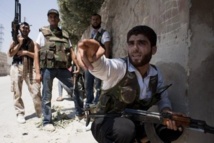
"I found it my duty to do everything I can, everything that I am able to, to pass the message over, and one of those duties was through music," Khalaf told AFP in Antakya.
"I am a rapper, I have been a rapper for the past seven years now... I've always rapped about reality, so that's another way of passing the message over."
While Antakya shelters many Syrian refugees fleeing the bloodshed, Khalaf is not one of them.
Speaking with a thick working-class London accent in English, he sounds like a young European on vacation.
But his father, he says, was the Sunni head of an outlawed political group who in the 1980s had to take his family out of Syria to live in exile.
Khalaf was born in the first leg of that exile, in Iraq, and picked up his passport -- Dutch -- as a child on the next leg in the Netherlands, before going on to Britain where he has spent most of his life.
It was in London seven years ago that he discovered his passion for rapping, performing in clubs and putting out two underground albums, some tracks of which he has uploaded to YouTube.
Now Antakya is his temporary new home, a base from which to travel back and forth into war-torn Syria, where he finds fuel for his angry lyrics, and picks up money translating from Arabic for British and US television news teams.
"When I went inside Syria, I didn't feel too different from the people. I actually felt like I was one of them, like I was grown up with them since we had the same thinking and the same belief," he said.
On initial contact, Syrians treated him as a foreigner, "until they heard me speak Arabic, and they just realised I'm actually one of them."
What he has seen has only bolstered his determination to use rap to try to galvanise greater attention for Syria's war.
The rap music scene is prolific in the Middle East as a whole, including in Syria, with more and more young people turning to the spoken word as a form of expression amid extreme violence.
Nearly always political, some rappers are virulently anti-regime, others are pro-, while still others choose to focus their lyrics on issues affecting the everyday lives of civilians caught in the spiralling conflict.
In Ahmed's latest song, he expresses his disbelief with the absence of international action to stop the bloodshed in his ancestral home.
He belts out: "It's unbelievable how it took place for two years. This lack of explanation's got me deaf in my two ears.
"As I'm sittin' down I look around at who's here, examine all the faces that are lost with a few tears."
--------------------------------------------------------------------------------------------------
"I am a rapper, I have been a rapper for the past seven years now... I've always rapped about reality, so that's another way of passing the message over."
While Antakya shelters many Syrian refugees fleeing the bloodshed, Khalaf is not one of them.
Speaking with a thick working-class London accent in English, he sounds like a young European on vacation.
But his father, he says, was the Sunni head of an outlawed political group who in the 1980s had to take his family out of Syria to live in exile.
Khalaf was born in the first leg of that exile, in Iraq, and picked up his passport -- Dutch -- as a child on the next leg in the Netherlands, before going on to Britain where he has spent most of his life.
It was in London seven years ago that he discovered his passion for rapping, performing in clubs and putting out two underground albums, some tracks of which he has uploaded to YouTube.
Now Antakya is his temporary new home, a base from which to travel back and forth into war-torn Syria, where he finds fuel for his angry lyrics, and picks up money translating from Arabic for British and US television news teams.
"When I went inside Syria, I didn't feel too different from the people. I actually felt like I was one of them, like I was grown up with them since we had the same thinking and the same belief," he said.
On initial contact, Syrians treated him as a foreigner, "until they heard me speak Arabic, and they just realised I'm actually one of them."
What he has seen has only bolstered his determination to use rap to try to galvanise greater attention for Syria's war.
The rap music scene is prolific in the Middle East as a whole, including in Syria, with more and more young people turning to the spoken word as a form of expression amid extreme violence.
Nearly always political, some rappers are virulently anti-regime, others are pro-, while still others choose to focus their lyrics on issues affecting the everyday lives of civilians caught in the spiralling conflict.
In Ahmed's latest song, he expresses his disbelief with the absence of international action to stop the bloodshed in his ancestral home.
He belts out: "It's unbelievable how it took place for two years. This lack of explanation's got me deaf in my two ears.
"As I'm sittin' down I look around at who's here, examine all the faces that are lost with a few tears."
--------------------------------------------------------------------------------------------------









 Home
Home Politics
Politics









